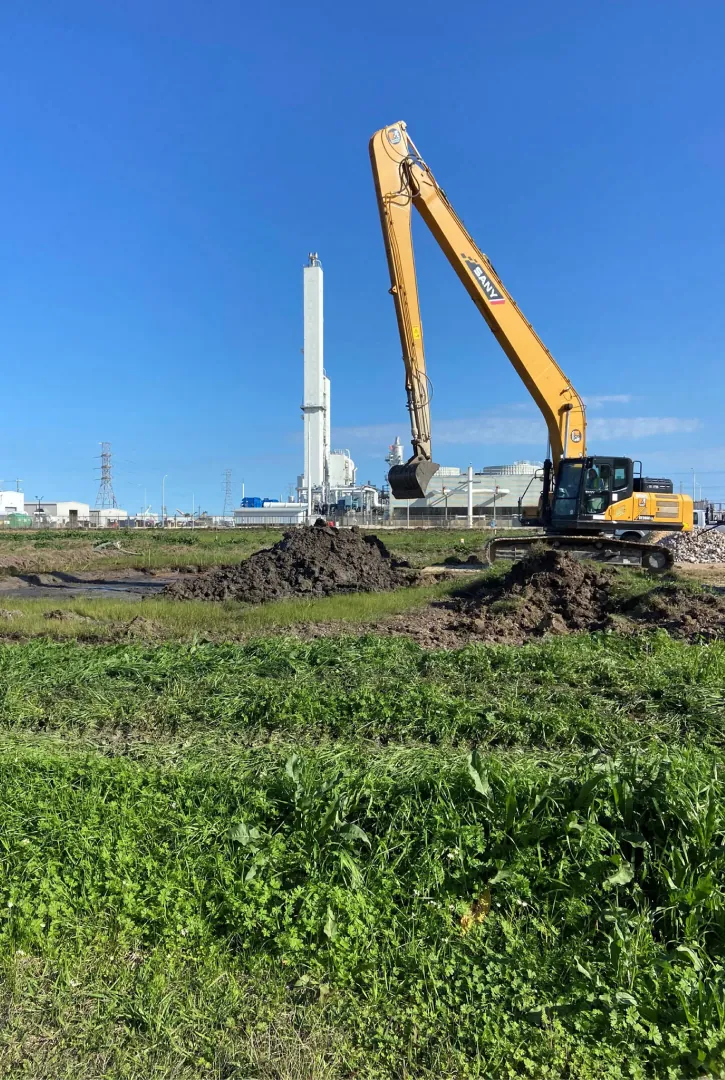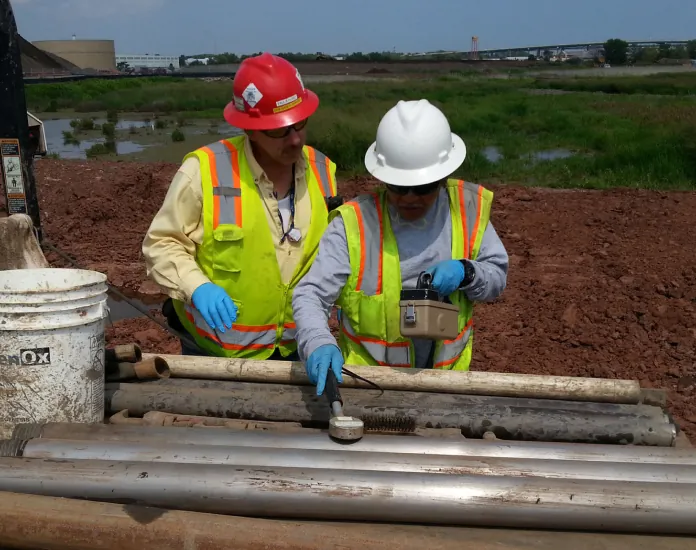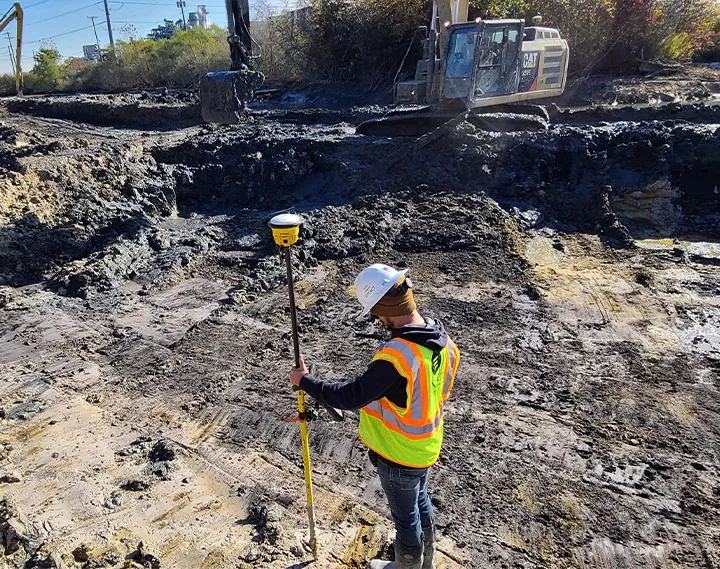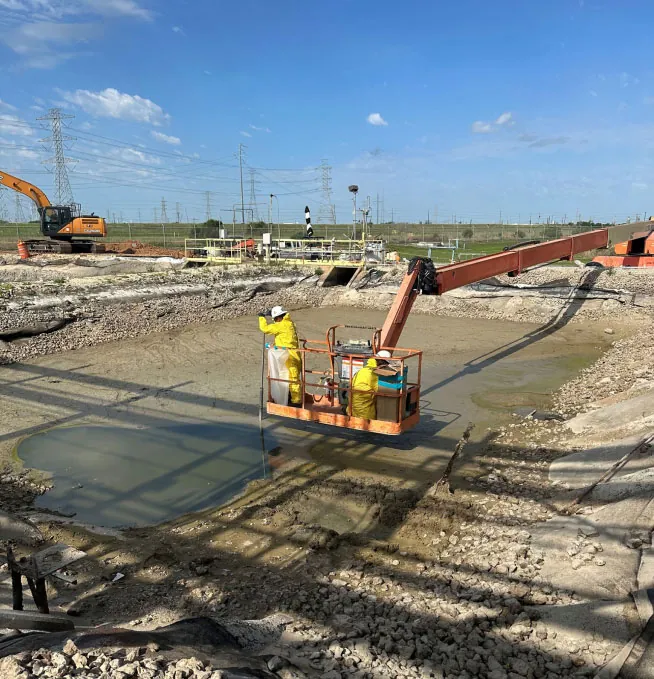Working safe in radioactive environments
Environments contaminated with higher than background concentrations of radioactive materials may result in undesirable radiation levels or radioactive exposure. These environments must be managed and controlled with the utmost safety precautions.
ENTACT employs health physicists, engineers, safety officers, and technicians who specialize in radiological management to make sure every step of the process is handled safely and meets or exceeds federal and state regulations. We work closely with our clients to reduce risks by developing customized solutions for each job - no project is the same.
Find out more about Auxier, a division of ENTACT dedicated to providing expert radiological services.


Radiological services
At ENTACT, we understand the importance of addressing radiological contamination with precision and expertise. That's why we offer a comprehensive range of radiological services, with a strong focus on regulatory compliance, safety, and sustainability.
- Emergency Response & Crisis Management
- Radiation Safety, Training, & Operational Management
- MARLAP Compliant Data & Data Validation
- On-site Radio-analytical Laboratory Services (ISOCS)
- Prepare and Audit Radiation Protection Programs
- Licensing & Regulatory Compliance
- MARSSIM-Compliant Radiological Site Characterization & Remedial Design
- Full or Partial Decontamination, Decommissioning and Delicensing Services
- Modeling (RESRAD, AERMOD, VSP, CAP88, MicroShield, PRG, and others)
- Dosimetry
- Dose & Risk Assessments
- Disposal of Radioactive Waste
More services
ENTACT also maintains a remote decontamination license, allowing us to serve as the licensed contractor of record for “Licensed Activity” anywhere in the U.S.
These services include:
- Training contractor groups (hydroblasters, boilermakers, pipefitters, etc.) to work on contaminated vessels under our license
- Chemical-chelation decontamination for complex shapes
- Sample collection and analysis
- 24-hour support with Health Physicists, Field Radiation Safety Officers, and Survey Technicians to manage contamination control zones
- Health physics consultation on waste disposal pathways
- Radiation safety management and guidance

Radioactive materials
ENTACT is licensed to address sites with naturally occurring radioactive materials (NORM), technologically enhanced naturally occurring radioactive materials (TENORM), naturally occurring and accelerator-produced radioactive materials (NARM), and radioactive elements with atomic numbers 1 through 95, excluding special nuclear materials. We also hold a multitude of licenses that allow us to self-perform work on affected sites, structures, or equipment in any state or territory and in any quantity.

ENTACT expertise
Our teams excel working on large and complex projects including rare earth processing facilities, mining sites, landfills, brownfield reclamation sites, and industrial sites. ENTACT holds significant assets of specialized equipment like portable decontamination units, monitoring instruments, and radiation survey equipment, allowing us to be mobile and agile in addressing our client’s needs nationwide. Our advanced equipment allows us to perform the majority of work on-site, helping to reduce costs and off-site laboratory services.
In addition to our equipment, we have a variety of surface preparation, cleaning, and proprietary decontamination technologies. We champion continued research and development to ensure that our methods are not only safe and effective, but also the most cost-effective and environmentally conscious solutions on the market.
Frequently asked questions
Radioactive materials are present throughout Earth’s crust. Many useful industries may incidentally cause radiological contamination through their normal operations (e.g., oil & gas exploration and production, mining, and petrochemical plants) since they work with materials pulled from within the Earth that may contain some of those radioactive elements. Radiological contamination may result from the use of contaminated fill dirt, an improperly or incompletely decommissioned industrial site, the movement of improperly decontaminated industrial equipment, or simply being in a region in which there are radioactive elements closer to the surface of the ground.
Examples include uranium, thorium, radium, plutonium, some isotopes of cesium, and some isotopes of iodine.
Radiological remediation techniques include decontamination, containment, and disposal tailored to the specific characteristics of the site and materials involved. These methods aim to reduce or eliminate radioactive contamination and minimize risks to human health, wildlife, and the environment.
Radiation exposure can cause various health effects depending on factors such as the type of radiation, levels of radiation, and duration of exposure. Health effects may include radiation sickness, cancer, genetic mutations, and other long-term health complications.
Regulations governing the cleanup of radioactive materials vary depending on the country, state, or region. They typically include guidelines for permissible exposure levels, waste disposal, remediation techniques, and reporting requirements. ENTACT ensures compliance with all relevant regulations to safeguard public health and the environment.
The duration of remediation efforts depends on multiple factors, including the extent of contamination, site complexity, available resources, and regulatory requirements. ENTACT works with our clients to evaluate site assessments and develop efficient remediation strategies to complete projects safely and expediently.
ENTACT prioritizes worker safety by implementing strategic safety protocols, providing comprehensive training, and supplying appropriate personal protective equipment (PPE). Continuous monitoring, dose assessments, and adherence to radiation protection standards minimize the risk of exposure and ensure a safe working environment.
In extraordinarily rare cases, radioactive waste can be recycled or reused. However, the possibility of recycling radioactive materials depends on factors such as type or waste, radiation levels, and regulatory restrictions.
ENTACT employs eco-friendly remediation techniques and adheres to sustainable practices to minimize environmental impact. This includes using biodegradable decontamination agents, implementing erosion control measures, and restoring affected ecosystems. Our commitment to environmental responsibility extends throughout all stages of our time on site.
